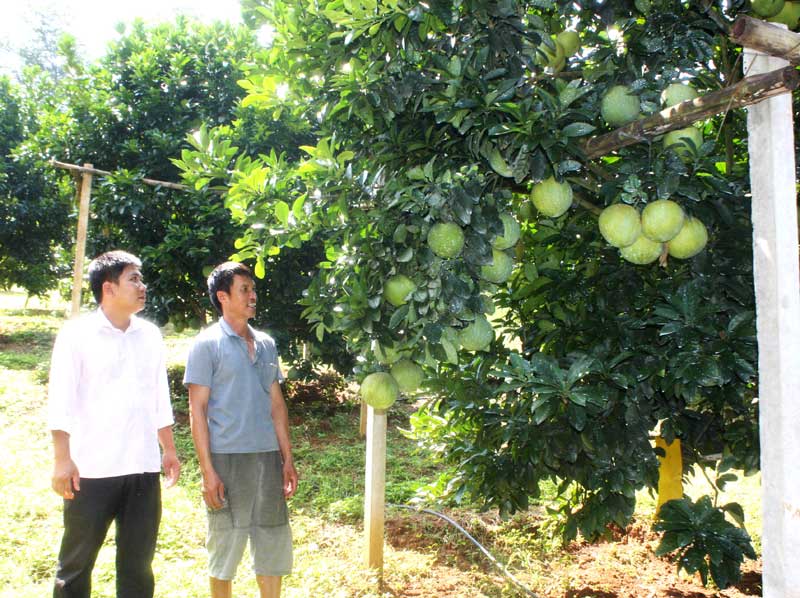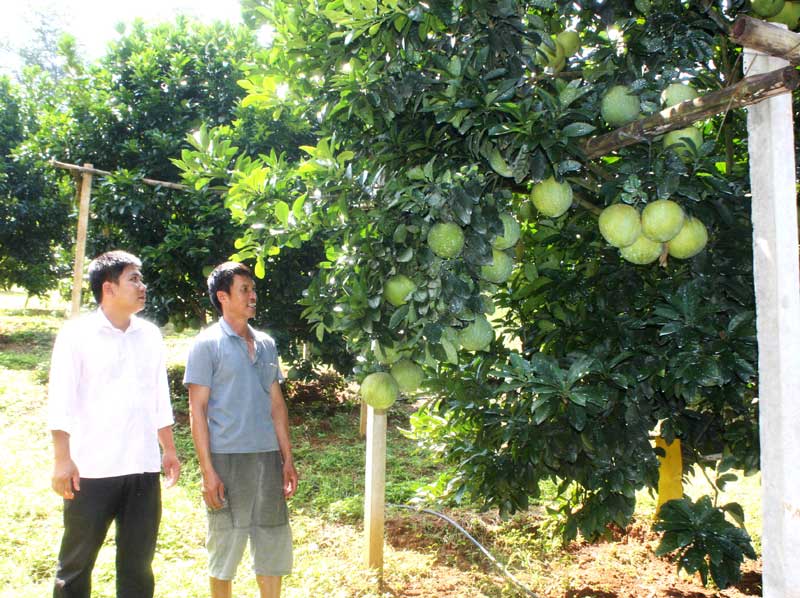
(HBO) - In recent years, thanks to the fast catching up market demand, farmers in Dong Lai Commune have actively transformed their economic structure. As a result, Dong Lai became one of the communes obtaining large areas of planting grapefruit and lemongrass in Tan Lac district. Many members of the Farmers' Union have changed their lives, creating an exciting atmosphere in the emulation movement to do good business.

The grapefruit garden of Mr. Nguyen Xuan
Chung family in Bai Trang 2 village.
It is not difficult to list the farmers
earning several hundreds of million dongs, even billion dongs from the red
grapefruit plantation in Dong Lai Commune. For example, the family of Mr. Dang
Minh Dung in Tan Lai village. On the area of 0.7 hectares of garden land,
before planting red grapefruit, Mr. Dung's family has planted many kinds of
trees but the income is uncertain. However, thanks to the destiny with red
grapefruit, up to now, from 200 grapefruits, his family regularly earns 300-400
million VND per year.
Besides Tan Lai and Dong Tien villages, the
grapefruit trees have been planted in all the villages of Dong Lai commune with
a total area of about 170 hectares, of which more than 70 hectares have been
harvested. Besides red grapefruit, lemongrass is also a highlight plant in the
economic structure of farmers in Dong Lai commune. This "easy-going"
tree was first planted in the villages of Ban Trang 1, Com. Up to now, the
lemongrass has been planted in almost all villages with an area of 116 hectares.
In order to have such these practical
results, in addition to the efforts of its members, Dong Lai People's Committee
has a lot of practical support, especially in supporting members to access
loans. Currently, The Farmers Association is entrusted with Social Policy Bank
and the Bank of Agricultural and Rural Development to loan more than 1,000
members with a total outstanding debt of 32 billion VND. "In order to
further promote the emulation movement in production, business and replication
of advanced models, we attach importance to the opening of training courses on
science - technology for its members, encouraging our members to bring high
economic value in organic production with high quality and cleaness. At
present, Tan Lai village has established the organic cooperative, this is the
direction of the commune Farmers Association to focus on all the villages in
the commune. Mr. Bui Van Tuan, Chairman of Dong Lai People's Committee said.
According to data from the Hoa Binh Provincial Party Committee, the industrial production index for the first six months of 2025 is estimated to have increased by 20% compared to the same period last year. This marks the highest year-on-year growth rate for this period since 2020.
In the first six months of 2025, Hoa Binh province’s export turnover was estimated at 1.145 billion USD, marking an 18.11% increase compared to the same period in 2024. Import turnover was estimated at $ 804 million, a 17.15% increase, which helped the province maintain a positive trade balance.
The lives of the ethnic minority farmers in Tan Lac district have gradually improved thanks to the new directions in agricultural production. This is a testament to the collective strength fostered through the professional associations and groups implemented by various levels of the district’s Farmers’ Union.
With the motto the "product quality comes first,” after nearly one year of establishment and operation, Muong village’s Clean Food Agricultural and Commercial Cooperative, located in Cau Hamlet, Hung Son Commune (Kim Boi district), has launched reputable, high-quality agricultural products to the market that are well-received by consumers. The products such as Muong village’s pork sausage, salt-cured chicken, and salt-cured pork hocks have gradually carved out a place in the market and they are on the path to obtaining the OCOP certification.
In the past, the phrase "bumper harvest, rock-bottom prices" was a familiar refrain for Vietnamese farmers engaged in fragmented, small-scale agriculture. But today, a new spirit is emerging across rural areas of Hoa Binh province - one of collaboration, organisation, and collective economic models that provide a stable foundation for production.
Maintaining growing area codes and packing facility codes in accordance with regulations is a mandatory requirement for agricultural products to be eligible for export. Recently, the Department of Agriculture and Environment of Hoa Binh province has intensified technical supervision of designated farming areas and packing facilities to safeguard the "green passport" that enables its products to access international markets.



